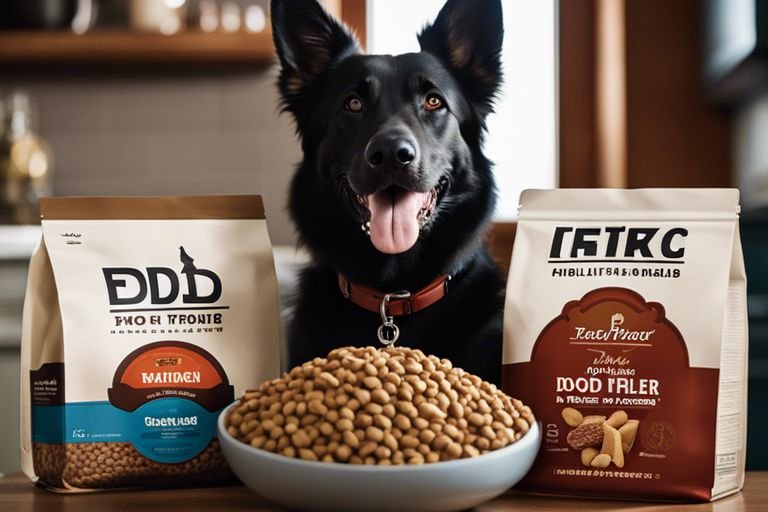Nutritionists’ Recommendations – Dog Food Additives For A Balanced Diet
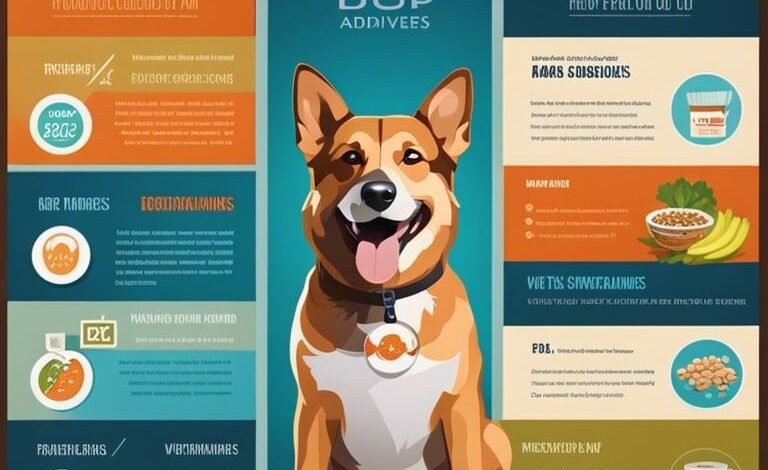
Just like humans, your furry friend’s diet plays a crucial role in their overall health and well-being. Nutritionists recommend specific dog food additives to ensure your canine companion gets a balanced diet. Let’s investigate into the crucial nutrients and supplements that can enhance your dog’s diet and keep them in top shape.
Key Takeaways:
- Balance is key: Nutritionists recommend dog food additives to help provide a balanced diet for your pet.
- Benefits of dog food additives: These dog food additives can help improve your dog’s skin, coat, digestion, and overall health.
- Consult with a professional: It’s important to consult with a veterinarian or pet nutritionist before adding any supplements to your dog’s diet.
- Quality matters: Ensure that the dog food additives you choose are high-quality and specifically designed for pet.
- Monitor your dog’s reaction: Keep an eye on your pet’s reaction to the dog food additives and make adjustments as needed based on their health and well-being.
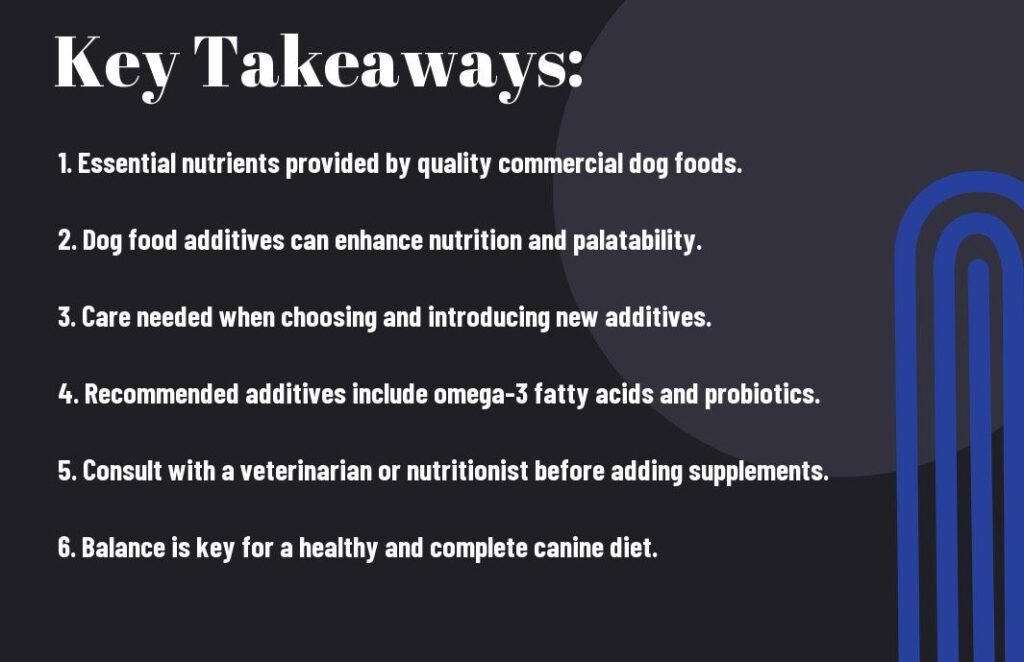
The Importance of Balanced Nutrition
Why Dogs Need a Varied Diet
To ensure your furry companion receives all the imperative nutrients for optimal health, a varied diet is crucial. Just like humans, dogs require a diverse range of nutrients to support their overall well-being. By incorporating a mix of high-quality proteins, carbohydrates, fats, vitamins, and minerals into their diet, you can help promote their energy levels, immune function, and muscle development. Additionally, offering a variety of foods can also prevent your dog from becoming bored with their meals, ensuring they maintain a healthy appetite.
Consequences of Nutrient Deficiencies
The repercussions of nutrient deficiencies in your dog’s diet can be serious and impact their quality of life. Without adequate levels of imperative nutrients such as protein, vitamins, and minerals, your dog may experience health issues ranging from weakened immune function to poor coat condition. These deficiencies can also lead to more severe conditions like growth abnormalities, organ damage, and even behavioral changes. It’s crucial to pay attention to the balance of nutrients in your dog’s food to prevent these detrimental effects.
Varied diets not only provide your dog with a wide array of imperative nutrients but also help prevent the likelihood of developing deficiencies in specific areas. By rotating between different protein sources, grains, and vegetables, you can ensure your dog’s diet remains well-rounded and meets all their nutritional needs. Consulting with a professional nutritionist can also help you tailor a diet plan that suits your dog’s individual requirements and keeps them healthy and vibrant.
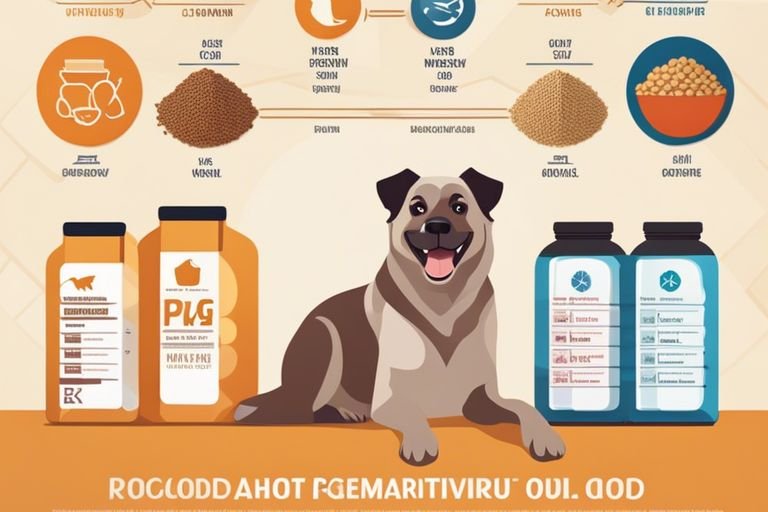
Essential Additives for a Balanced Diet
The foundation of your dog’s diet should include necessary additives that promote overall health and well-being. These dog food additives play a crucial role in ensuring your furry friend receives the necessary nutrients for a balanced diet.
Omega-3 Fatty Acids for Skin and Coat Health
With Omega-3 fatty acids, such as fish oil, in your dog’s diet, you can significantly improve their skin and coat health. These necessary fatty acids help reduce inflammation, alleviate dry, itchy skin, and promote a shiny, lustrous coat. Incorporating Omega-3 fatty acids into your dog’s diet is especially beneficial for breeds prone to skin allergies or coat issues.
Probiotics for Gut Health
On top of Omega-3 fatty acids, adding probiotics to your dog’s diet can enhance their gut health. Probiotics are beneficial bacteria that support digestion and gut function, improving nutrient absorption and boosting the immune system. A healthy gut is necessary for your dog’s overall well-being, as it aids in preventing gastrointestinal issues and promoting a strong immune response.
Antioxidants for Immune System Support
An antioxidant-rich diet is crucial for bolstering your dog’s immune system and protecting against oxidative stress. Antioxidants, such as vitamins C and E, help neutralize free radicals in the body, reducing the risk of chronic diseases and supporting your dog’s overall health. Including foods rich in antioxidants in your dog’s diet can have long-term benefits for their immune system and longevity.
Common Deficiencies in Commercial Dog Food
Keep in mind that not all commercial dog foods are created equal, and some may lack important nutrients that are crucial for your pet’s health. It’s important to be aware of common deficiencies in commercial dog food so that you can make informed decisions when selecting the best diet for your furry friend.
Protein Deficiencies and Their Impact
An adequate amount of protein is vital for your dog’s overall health and well-being. Protein deficiencies in commercial dog food can lead to a variety of health issues such as muscle weakness, poor coat quality, and reduced immune function. To ensure your dog receives enough protein, look for high-quality dog foods that list a quality animal protein source, such as chicken, beef, or fish, as the first ingredient.
Vitamin and Mineral Deficiencies
Dog Food additives play a crucial role in ensuring that your pet receives the important vitamins and minerals needed for optimal health. Without these nutrients, your dog may experience deficiencies that could result in serious health problems. It’s important to check the ingredient list on your dog’s food to make sure it contains a balance of vitamins and minerals necessary for their well-being.
Mineral deficiencies, such as calcium and phosphorus, can lead to bone and teeth issues in your dog. Inadequate levels of these minerals can result in weak bones, dental problems, and overall skeletal issues. To prevent mineral deficiencies, choose dog foods that are formulated with the right balance of important minerals to support your pet’s bone health.
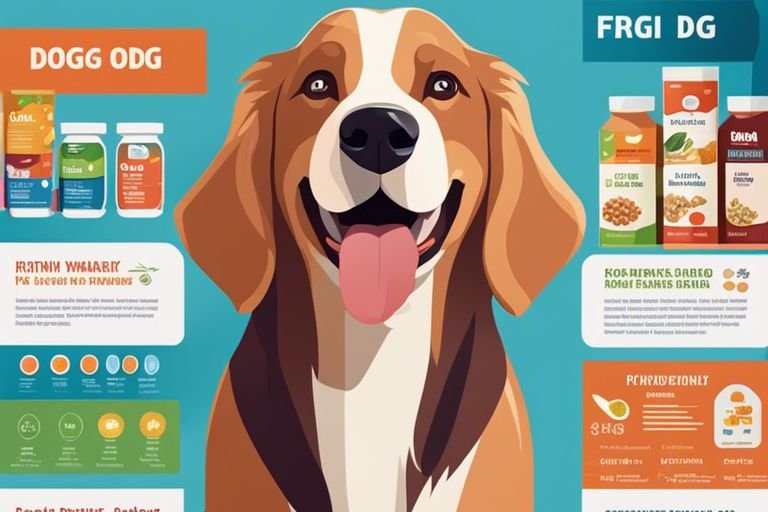
Choosing the Right Additives for Your Dog
Factors to Consider When Selecting Additives
All dog food additives are not created equal. When choosing the right supplements for your furry friend, there are a few key factors to consider. First and foremost, you should take into account your dog’s specific dietary needs and any health issues they may have. Consult with your veterinarian or a canine nutritionist to determine which additives will best support your dog’s overall health and well-being.
- Consider the reputation of the brand and the quality of the ingredients used in the supplements.
- Look for additives that are made from natural sources and are free from artificial colors, flavors, and preservatives.
- Check for certifications or approvals from reputable organizations to ensure the effectiveness and safety of the additives.
Knowing what to look for in a dog food additive will help you make an informed decision that benefits your furry companion’s health in the long run.
Reading Labels and Identifying Quality Ingredients
Your pet’s health depends on the quality of the ingredients in their dog food additives. When deciding on supplements, it’s crucial to carefully read the labels and identify high-quality ingredients that will support your dog’s nutritional needs. Look for additives that list real meats, vegetables, and fruits as the main ingredients, as these will provide imperative nutrients for your dog’s health.
Selecting additives with whole, natural ingredients ensures that your dog receives the best nutrition possible. Labels that contain vague or generic terms should be avoided, as they may indicate lower quality ingredients that do not offer the same health benefits for your dog.
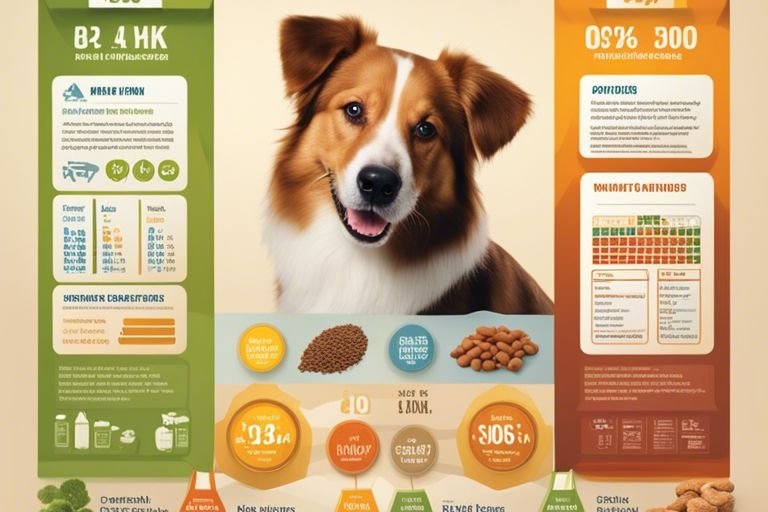
Nutritionist-Recommended Additives for Specific Life Stages
Puppies: Supporting Growth and Development
After consulting with a nutritionist, you’ll find that puppies have specific nutritional needs to support their rapid growth and development. The right additives can make a significant difference in ensuring your puppy’s healthy start in life.
Adult Dogs: Maintaining Optimal Health
Supporting your adult dog’s overall health and well-being is crucial to keeping them active and thriving. Essential additives recommended by nutritionists can aid in maintaining their optimal health.
To help ensure your adult dog remains in top shape, consider incorporating supplements such as omega-3 fatty acids for joint health, probiotics for gut health, and antioxidants for immune support. These additives can complement your dog’s balanced diet and contribute to their overall longevity and quality of life.
Senior Dogs: Addressing Age-Related Issues
The nutritional requirements of senior dogs change as they age, and addressing age-related issues becomes increasingly important. Nutritionists may suggest specific additives to help support your senior dog’s health and vitality.
The inclusion of glucosamine and chondroitin for joint support, as well as additional vitamins and minerals for cognitive function, can benefit your senior dog in their golden years. This tailored approach to their diet can help alleviate age-related issues and keep them comfortable and happy as they age.
Potential Interactions and Side Effects
Not all additives in your dog’s food may interact well with medications they are currently taking. Some additives can interfere with the absorption or effectiveness of certain drugs. It is crucial to consult with your veterinarian or a pet nutritionist before introducing any new additives to your dog’s diet, especially if they are on medication.
Additive Interactions with Medications
One way to avoid potential interactions between additives and medications is to inform your veterinarian about any changes you make to your dog’s diet. They can provide guidance on which additives may be safe to use alongside your dog’s medication regimen. Additionally, they may suggest alternative additives that can complement your dog’s treatment plan without causing any unwanted interactions.
Monitoring Your Dog's Response to New Additives
Potential side effects from new additives can vary from digestive issues to allergic reactions. Observing your dog’s response to any newly introduced additives is necessary. You should monitor their behavior, stool consistency, energy levels, skin condition, and overall well-being. If you notice any adverse effects, it is recommended to stop using the additive and consult with your veterinarian.
Understanding how your dog reacts to different additives can help you tailor their diet to meet their specific nutritional needs. Taking note of any changes, positive or negative, can guide you in selecting the best additives to support your dog’s health and well-being.
Summing up
In the matter of ensuring your dog receives a balanced diet, it is imperative to pay attention to the additives present in their food. As nutritionists recommend, incorporating imperative nutrients such as Omega-3 fatty acids, antioxidants, and probiotics can contribute to your dog’s overall health and well-being. By choosing reputable dog food brands that include these additives, you can provide your furry friend with a nutritious diet that meets their dietary needs.
Note, just like with our own diets, variety is key. Mixing up your dog’s food with different protein sources and incorporating a range of beneficial additives can help support their immune system, digestion, and overall vitality. By following the recommendations of nutritionists and being mindful of the additives in your dog’s food, you can ensure that your canine companion is getting the nutrition they need to thrive.
FAQ
Q: What are the benefits of dog food additives for a balanced diet?
A: Dog food additives can provide important nutrients, improve digestion, support immune health, and enhance the overall well-being of your pet.
Q: Are all dog food additives safe for consumption?
A: Not all additives are safe for dogs. It is important to consult with a veterinarian or a qualified nutritionist before introducing any new additives to your dog’s diet.
Q: How can I determine the right dog food additives for my pet?
A: Every dog has unique dietary needs. A nutritionist can help assess your dog’s diet and recommend specific additives based on their age, breed, size, and health condition.
Q: Can dog food additives replace a balanced diet?
A: Dog food additives should complement a balanced diet rather than replace it. It is crucial to provide a variety of high-quality foods to ensure your dog receives all the necessary nutrients.
Q: What are some common dog food additives recommended by nutritionists?
A: Some common dog food additives recommended by nutritionists include omega-3 fatty acids, probiotics, vitamins (such as vitamin E and D), minerals (such as calcium and phosphorus), and antioxidants.
